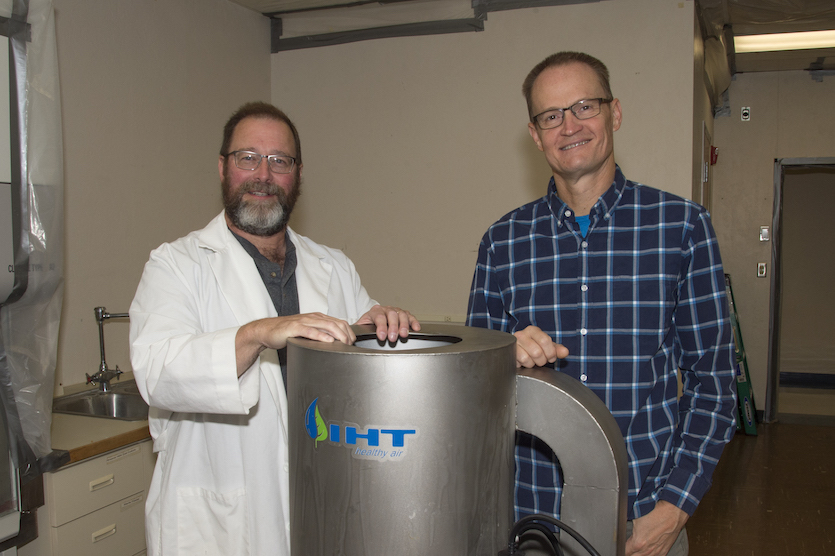Idaho State University teams up with partners to protect crops against molds
September 26, 2017

POCATELLO – Idaho State University researcher Peter Sheridan and his partners at Idaho Hydro Tech (IHT) and Boise State University are teaming up on green technology to protect stored potatoes and other crops from molds and, potentially, other pathogens.
The Idaho Global Entrepreneurial Mission (IGEM) grant from the Idaho Department of Commerce is funding their efforts, of which ISU’s share is $191,500. The partners will be working on this specific project through June 2018.
To protect potatoes from molds now, farmers sometimes treat their entire harvested crop with fungicides and other chemicals to protect them during storage season. Blackfoot-based company IHT, however, has developed a machine that goes into potato storage facilities and uses only water to clean and humidify the air. With this “Humigation™” method, farmers no longer need fungicides to protect the potatoes from mold.
“There is a ventilation system in every storage unit, so we work with that system to scrub the air as it moves through. This stops the spread of disease through the air, and we raise humidity to optimal levels,” said Blake Isaacs, CEO of IHT.
Isaacs said he wanted to work with Idaho State University to build on the testing IHT had already done on the process, especially removing microbes.
“We want to get enough information to shape our future research and development strategy,” Isaacs said.
“It is really exciting that we are helping a business that will help Idaho growers, not just of potatoes, but for the storage of other crops,” said Sheridan, a microbial biochemist who is a professor of biological sciences at ISU. “And we are not only testing our ability to scrub mold spores but also bacteria and viruses in other experiments. We’re testing the limits and potentials of this technology.”
At Boise State University, researchers are working on sensors that deploy in potato storage units and detect chemical byproducts of microbes that cause spoilage.
“The Boise State University project complements our work because it detects the presence of disease so you can pinpoint with precision where the disease is located in a storage area,” Sheridan said. “So, instead of throwing out the whole crop, you can target a hotspot. Our projects dovetail nicely, because if some pathogens aren’t caught by the filtration system we will be able to tell where they are in a very targeted way and just pull out the potatoes or other crops that are infected. This is going to be a big savings for growers.”
Sheridan and Isaacs said they are pleased with the budding partnership.
“This is an excellent example of the type of business-university partnership that IGEM wants to promote,” Isaacs said. “This is a one-year grant, but with the amount of work we’ve proposed, we will ask for an extension or seek funding elsewhere. There’s value in this kind of partnership, and I see a lot more of it continuing in the future.”
The pair is looking at other applications for the technology.
“The next phase we are already looking at is how to miniaturize their technology,” Sheridan said. “Right now the technology is for potato barns, but the technology for scrubbing air in a filterless way could have a lot of offshoots. Smaller units could be used in businesses, schools and classrooms to clean the air in a cost-effective manner.”
“IGEM is a tremendous opportunity,” Isaacs said. “We are going to find ways to keep working together because there is extraordinary value in doing so. This is just the beginning of our partnership with the university.“
Categories:
